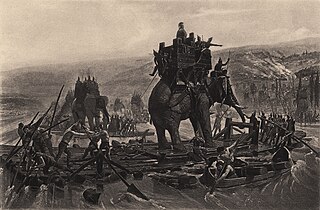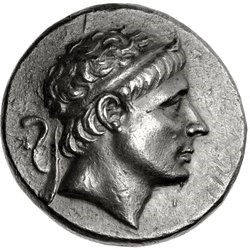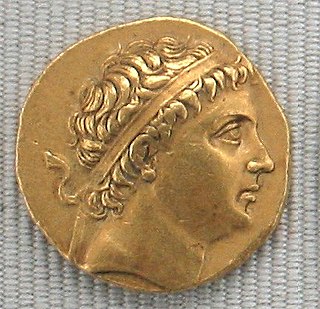
The Seleucid Empire was a Greek power in West Asia during the Hellenistic period. It was founded in 312 BC by the Macedonian general Seleucus I Nicator, following the division of the Macedonian Empire founded by Alexander the Great, and ruled by the Seleucid dynasty until its annexation by the Roman Republic under Pompey in 63 BC.

The 3rd century BC started the first day of 300 BC and ended the last day of 201 BC. It is considered part of the Classical Era, epoch, or historical period.
This article concerns the period 229 BC – 220 BC.

This article concerns the 200 BC decade, that lasted from 209 BC to 200 BC.
This article concerns the period 289 BC – 280 BC.
This article concerns the period 279 BC – 270 BC.
This article concerns the period 269 BC – 260 BC.
This article concerns the period 259 BC – 250 BC.
This article concerns the period 249 BC – 240 BC.
This article concerns the period 239 BC – 230 BC.
Year 246 BC was a year of the pre-Julian Roman calendar. At the time it was known as the Year of the Consulship of Crassus and Licinus. The denomination 246 BC for this year has been used since the early medieval period, when the Anno Domini calendar era became the prevalent method in Europe for naming years.
Year 224 BC was a year of the pre-Julian Roman calendar. At the time it was known as the Year of the Consulship of Torquatus and Flaccus. The denomination 224 BC for this year has been used since the early medieval period, when the Anno Domini calendar era became the prevalent method in Europe for naming years.
Year 226 BC was a year of the pre-Julian Roman calendar. At the time it was known as the Year of the Consulship of Messalla and Fullo. The denomination 226 BC for this year has been used since the early medieval period, when the Anno Domini calendar era became the prevalent method in Europe for naming years.
Year 239 BC was a year of the pre-Julian Roman calendar. At the time it was known as the Year of the Consulship of Turrinus and Falto. The denomination 239 BC for this year has been used since the early medieval period, when the Anno Domini calendar era became the prevalent method in Europe for naming years.

Antiochus I Soter was a Macedonian king of the Seleucid Empire. Antiochus succeeded his father Seleucus I Nicator in 281 BC and reigned during a period of instability which he mostly overcame until his death on 2 June 261 BC. He is the last known ruler to be attributed the ancient Mesopotamian title King of the Universe.

Antiochus II Theos was a Greek king of the Hellenistic Seleucid Empire who reigned from 261 to 246 BC. He succeeded his father Antiochus I Soter in the winter of 262–61 BC. He was the younger son of Antiochus I and princess Stratonice, the daughter of Demetrius Poliorcetes.

Seleucus II Callinicus Pogon, was a ruler of the Hellenistic Seleucid Empire, who reigned from 246 BC to 225 BC. Faced with multiple enemies on various fronts, and not always successful militarily, his reign was a time of great turmoil and fragmentation for the Seleucid empire, before its eventual restoration under his second son and eventual successor, Antiochus III.

Diodotus I Soter was the first Hellenistic king of Bactria. Diodotus was initially satrap of Bactria, but became independent of the Seleucid empire around 255 BCE, establishing the Greco-Bactrian Kingdom. In about 250 BCE, Diodotus repelled a Parthian invasion of Bactria by Arsaces. He minted an extensive coinage and administered a powerful and prosperous new kingdom. He died around 235 BCE and was succeeded by his son Diodotus II.
Lord Changping was a Chinese monarch and politician who remained as an important military commander and lord of Qin, who later departed from the state of Qin and went to the state of Chu where he became the last king of Chu in the last days of the Chinese Warring States period.






